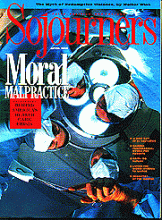Cape Fear and Silence of the Lambs are two of the most critically acclaimed movies of the past year and potentially big winners in the Academy Awards. Both movies are cinematic masterpieces of their genre and provided vehicles for memorable performances by some of Hollywood's most accomplished actors, including Robert DeNiro, Jodie Foster, Anthony Hopkins, and Nick Nolte.
But exactly what genre are we talking about in these two movies? They are hailed by the male-dominated reviewing fraternity as "psychological thrillers." Do they warrant that distinction, won so deservedly by such greats as Alfred Hitchcock and Orson Welles? Or are they simply woman-hating slasher films disguised by technical accomplishment?
Let's take a moment to summarize the plots. In both movies, a psychopathic killer is on the loose, threatening mayhem in the form of rape, torture, flaying, starvation, disfigurement, sodomy, and eventual death. The women in the two movies are menaced with piano wire, handcuffs, dressmakers' tools, plaster casts, night vision goggles, handguns, and countless open backhands or closed fists.
The primary psychopath in Silence of the Lambs kidnaps women and starves them to near death by chaining them in a basement pit. He then kills them and removes choice pieces of their famine-loosened skin. The skin pieces are sewn into a suit that will turn him into a woman. Hannibal, the secondary psychopath of the movie, played by Anthony Hopkins, is a cannibal, but it can be argued in his favor that his palate does not discriminate between male or female victims. The character played by Jodie Foster, an FBI trainee named Clarice, is presented throughout the movie as either a potentially tasty morsel for Hannibal or a fetching addition to the dressmaker's skin suit.
Read the Full Article

